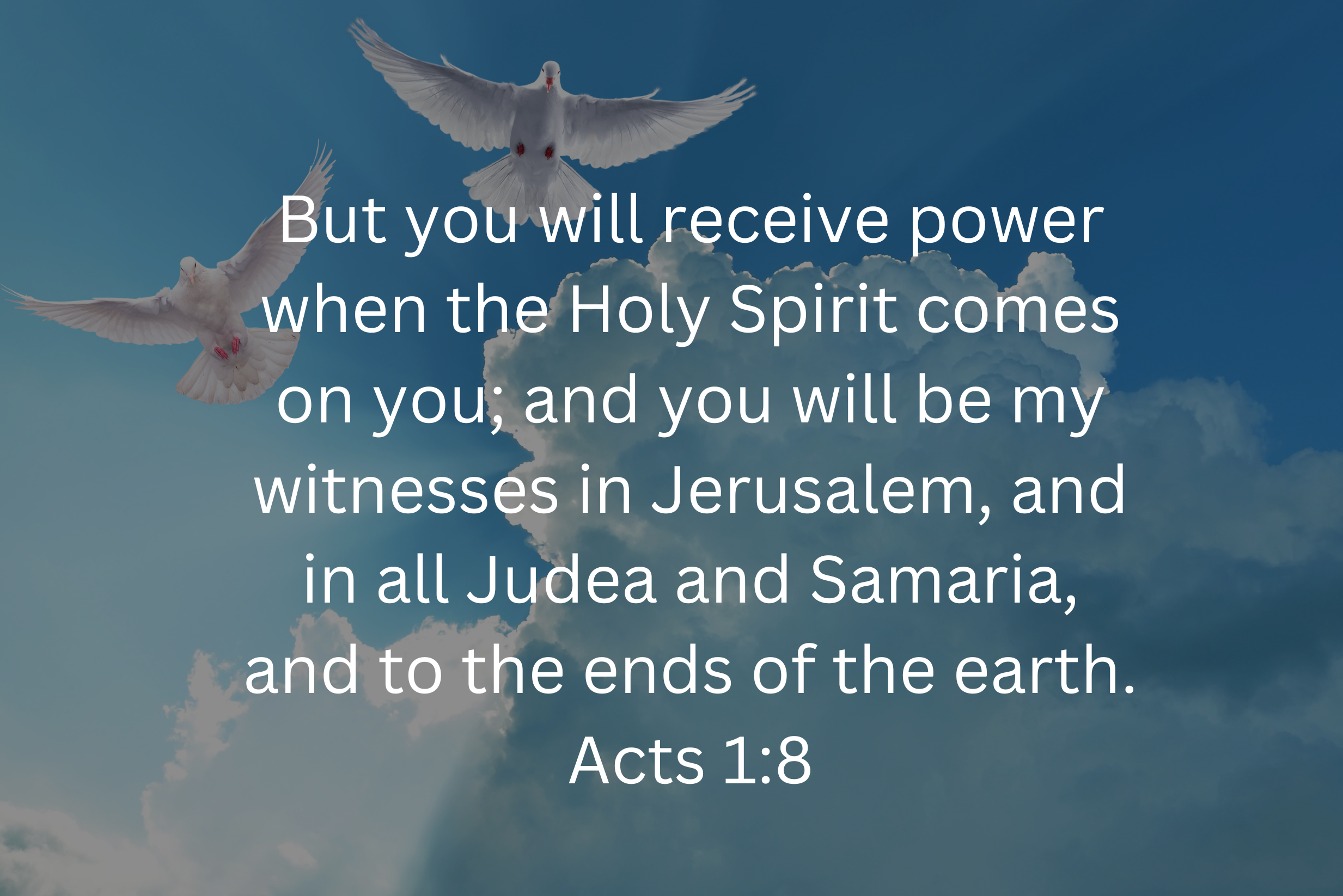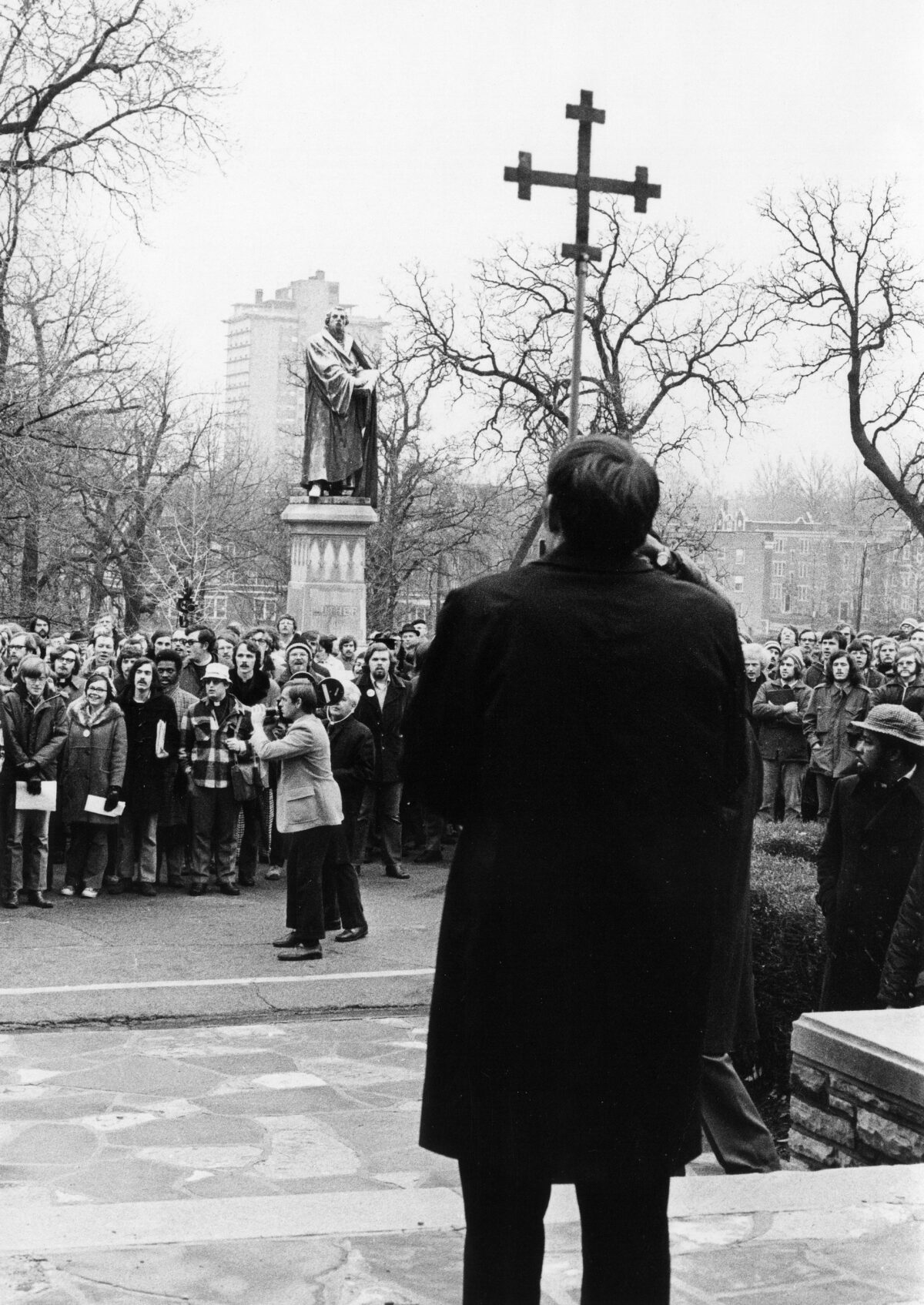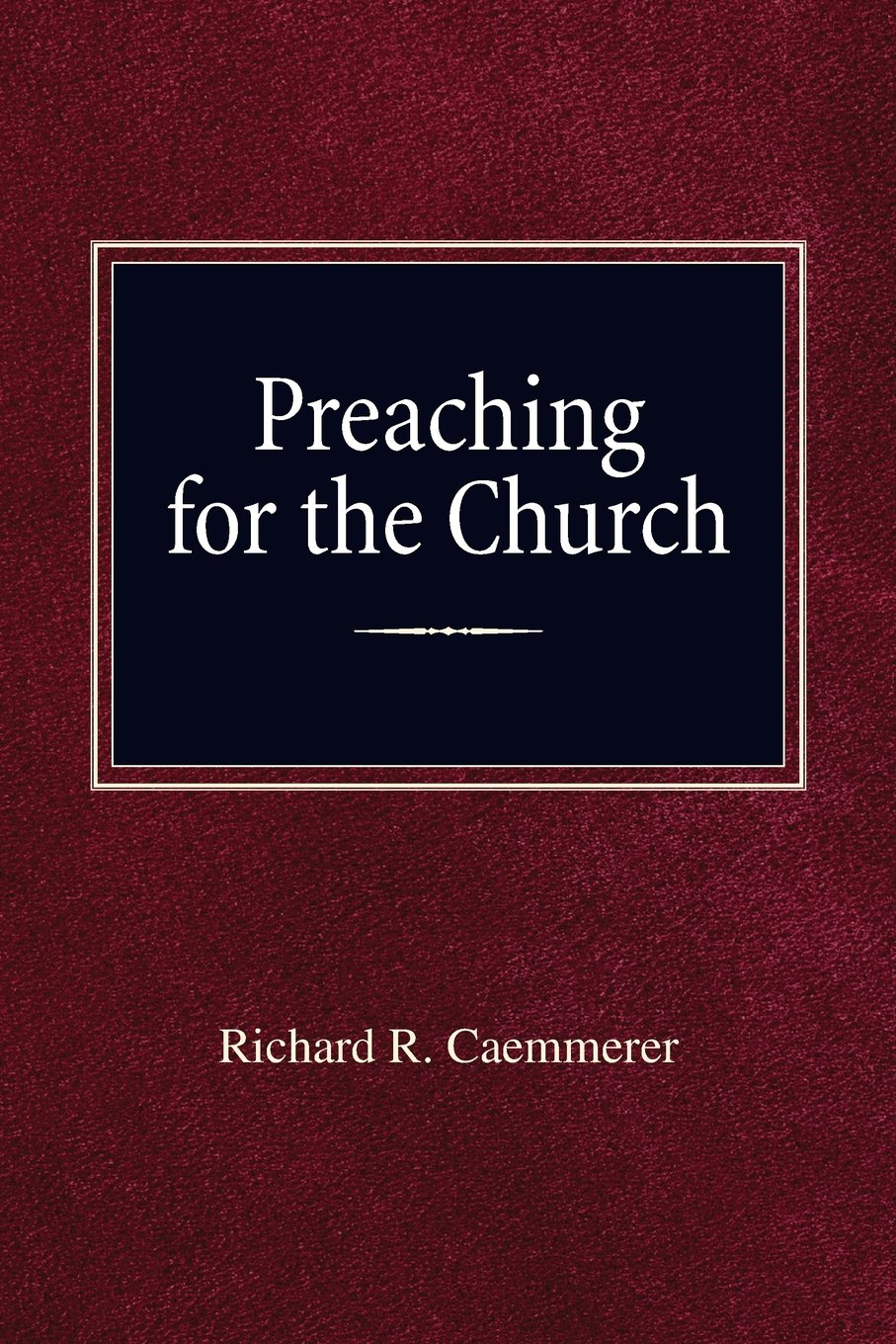Co-missioners,
The Crossings Community meets at the end of next month to confer on the topic, “The Promising Community: Can I Have a Witness?” The second half of this title was supplied by our colleague, Bruce Modahl, who has heard the phrase used in predominantly Black churches as preachers call for an on-the-spot response to the promises of the Gospel.
You’ll hear a similar call for witnesses in today’s post. It comes from a teacher of preachers, the late, great Richard R. Caemmerer, Sr., who served for nigh on forty years as a professor of homiletics at Concordia Seminary, St. Louis, and Christ Seminary—Seminex. His grasp of the Gospel and his method of conveying it left a deep imprint on at least two generations of Lutheran preachers across the U.S. and beyond. It also shaped the work we do at Crossings today. Our current community includes any number of aging pastors who sat for a formative spell in Caemmerer’s classrooms. Still others learned their preaching craft from teachers Caemmerer had taught.
In 1978, Currents in Theology and Mission, launched four years earlier as the theological journal of Seminex, devoted an entire issue to an essay by Dr. Caemmerer entitled “No Continuing City.” Our editor ran across it by happy accident some weeks ago and found it brimming with riches that scream for sharing. Below are a few of the choicer gems. Each of them touches at some point on the nature of the Gospel as the gift of gifts which requires a witness of one kind or another.
Taken as a whole, “No Continuing City” can be read as an autobiographical reflection on a career that ended in the wistful grief of ecclesiastical dislocation. A truer perspective will grasp it as a stunning witness in its own right to the wondrous ways of God in teaching people what the Gospel is and is not, and even more to the Gospel’s power to shape minds and hearts and outlooks, in this case Caemmerer’s own. To offer such a witness was certainly Caemmerer’s intention. His subtitle for the essay is “A Memoir of Change Toward Deepening and Growth in Jesus Christ.” And so it is. The entire essay runs to forty-seven pages, far more than we could reproduce in Thursday Theology even if copyright law permitted such a thing, which it doubtless does not. We hope the little you encounter here will prompt you to visit a theological library or dig through your own stacks of old journals to find the original. To read it from start to finish will more than reward the effort it takes to do that.
Peace and Joy,
The Crossings Community
__________________________________________________________________
Selections from “No Continuing City”
by Richard R. Caemmerer, Sr. (1904-1984)
From Currents in Theology and Mission, Vol. 5, No. 5. (St. Louis: Seminex, 1978), 268-315
Selection Titles Supplied by Thursday Theology
On Learning What the Church Is
Many years of service to a Lutheran church body might be expected to accentuate denominational authority and concerns. This is part of the drama of my experience: The meaning of the church set out in the New Testament has become clearer and more practical, namely that the church is wherever Christians are who are helping each other to be Christian, namely by safeguarding and enlarging the primacy of Jesus Christ. That makes two centers of the church primary: “The church in the house,” or the Christian family, and the Christian parish or congregation. So easily in the past these tended to be thought of as miniatures of the church, or prefaces to it, by comparison with a larger church body. Actually they are it. The more the church denomination is liable to arrogate the meaning of the church to itself…the more noteworthy and indispensable the concrete and immediate units of family and congregation become.
For Jesus Christ promises to be in the midst of even only two or three provided that they have been gathered “into” His name, and are mutually helping each other to keep Him central and foremost. His picture of His primacy and authority isn’t so much that of a king, as it is of bread, the kind that gives nourishment to the very life of God in the human heart by virtue of His having given Himself up into death for the sins of the world. (271)
Along with Job I had my years when I thought that trouble, and particularly trouble in the church, in some obscure way meant that God was backing off and not doing His job; or that He was letting people know that He was against them. I could praise the disciples for taking up the Cross of Christ or fulfilling in their own bodies the sufferings of Jesus, but I assumed that they were at a comfortable distance from me.
It is one of the wonderful privileges of the pastoral ministry that it gives [pastors themselves] some better insights. The cross that Jesus asks His followers to bear isn’t trouble in general; but it is such difficulty by which they find themselves turned more completely to Him as helper, and when finding it become more clearly witnesses to the power of His love. Nor does that power display itself always in the removal of surface trouble. The prayer which our Lord taught us is remarkably inexplicit about the surface comforts that are to replace our pains; but it is rich in the account of the life of God in our hearts and wills and of delivery not just from poverty or pain but from evil—the Evil One. (271-2)
On Disappointment with “the Wider Church”
…The compound operation of God testing a whole culture and a whole church body—how does that work? Would God be so thoughtless, so downright mean, that He could be sending a lot of good things down the drain with some that are bad? Of course He could; the sacred record is crowded with the instances, and the judgment of God in the prophets is especially explicit upon honorable people that seemed to deserve it least. … I have to realize that God is Himself is at work in the debasement of churches, and not just Satan.
Along with every individual trial the church body has to be asking itself: What are you doing? And then it has to be praying: God, put us on the track and the search for your grace. For only so can we be said to be witnesses of your grace, if we have and use it in Jesus Christ our Lord and if we are a community that shares Him and your love in Him. Otherwise the disappointments in church administration and support, in Christian mission and prestige of the Gospel, are only disheartening and grotesque.
“For the moment all discipline seems painful rather than pleasant; later it yields the peaceful fruit of righteousness to those who have been trained by it.” (272)
On Belonging to Christ: Four Characteristics
…Slowly I have learned what Jesus Christ is doing to me and to all of us, beginning with our baptism into His name, that he makes us members of His body.
The first meaning of this we have already reviewed. He makes each one of us suffer, just as He gave up the members of His own body on the Cross. A whole series of practical implications suspends from this fact.
1) We have to be attached to Him. We proclaim him as Savior and Lord, in words and ceremonies and projects and evangelism and what not. But all the apparatus is abortive if it does not honestly proclaim Him. It does that only if we are “in Him” and He in us. A first order of business for the church, beginning with the household, is therefore cultivating attachment to Christ….
2) We have to look attached to Him. That is the meaning of witness, “martyr,” whether we are that way in the extremities of dying for Him, or in the exhibition of being alive in Him. I have emerged from a culture that considered our Christian faith a very private matter, now to realize that faith is to be confessed, exhibited, talked about. And we are to be the kinds of people that recommend such faith and make it seem preferable to any other way of life.
3) We have to be attached to each other. That is the implication of the picture of the body, for members do not function in a body unless they are attached to each other. The attachment is not just spatial, but is the mechanism of concern and of the kind of love that Jesus Himself had for the world.
Here we come to an ingredient in the life of the church which we evidently find the most difficult. The language of dogma leaves it in the abstract and calls it unity. The people of the church are apt to shield themselves from the charge of disunity by applying the term to a philosophical and imaginary union between all Christians, regardless of how badly fragmented their fellowship may be on the surface. Or they concoct a theory of the church which views it in its visible and invisible dimensions. Thus the church allows itself to fall into grotesque uses of Biblical terms like ‘fellowship” in order to define, not the relation of all Christians to each other, but the differences between them allowing only certain ones to feel themselves connected with others.
The horror of this is that the Holy Communion itself, with the explicit warning of St. Paul on pain of condemnation not to avoid being aware of the body of Christ in the communion fellowship, becomes a vehicle of separation….
4) We have to be open to the world. It has to be able not just to see us in our relations to each other, and to hear us as we proclaim the Good News, but it has to be able to get close to us, and to want to belong to us. Christians have found this difficult, for they also have the charge not to love the world and the things of the world, and to be alert in avoiding the false ways of life that are characteristic of the world. But the fact remains that the love of Christians is to be exerted to all people, and not just in sound and syllable, but in Witness. This demonstration of the meaning of God’s work to us in Christ involves the activity of our total lives…. (272-3)
On the Bible  and the Word of God
and the Word of God
In the Scriptures I found that the Word of God is simply Jesus Christ. The First Chapter of the Gospel according to St. John makes clear how wide and deep that Word is in the work of God and the life of people; for He is not simply redeemer, but also creator and preserver, and the gift of the Holy Spirit himself suspends from Jesus’ work. The Word of God is the action by which He reaches into human life to produce, sustain, redeem and renew, down to melting snow. “It is not the way of the New Testament to write books”—this phrase of Luther’s opened the way to the realization that the Gospel is not a department of Biblical knowledge, one of the loci of theology, but it is the great message, “das Evangelium muss geshrieen warden,” the Gospel has to be shouted at people. For its power lies not just in its vocabulary, or in a process by which it can be demonstrated that it is trustworthy, but in the way by which the Christ who died and rose again translates Himself from age to age through the witness of other people who have believed in Him through the power of the Holy Spirit holding up His work in their minds. The Word of God is more than words from God—although God certainly employs such words in the process—but it is the action of God in Christ. (281-2)
On the Purpose of Preaching: A Discovery as a Young Depression-Era Pastor
To serve in an emergency in 1935 I was asked to teach a course at the seminary in St. Augustine’s work “De doctrina christiana.” Supposed that title means “concerning Christian doctrine.” But it is a handbook on preaching; doctrina is the Latin word for the process of teaching and preaching. Now it dawned on me that preaching is not simply saying the right things to people in a church service, but it is just one phase of the process by which the pastor brings the nurture of the Word of God and the work of Christ’s redemption into the minds and lives of his hearers and parishioners.
I learned, furthermore, that this imparting of the Word of God was not simply for the sake of the people’s knowing it, but that the Word is preached in order to produce fruits, just as a seed is sown so that it produces a crop. The first crop, obviously, in the years of suffering and trial that the church and pastorate could help to produce was continued faith and courage, the convictions that God still loved His people. But close on its heels was the mutual love of God’s people, their will to care for each other in need. I had mouthed the phrases of Gospel to the supply of Christian love already as a student. Now in the Depression-tested parish I could see that it actually worked. This love meant not merely acts of mutual charity in need, but it meant the unity of God’s people. The Augsburg Confession now became a simple formula. To get Christians to work together you don’t merely admonish and give out projects, but you preach the Gospel of Jesus Christ, you have people attend the Sacrament of the Eucharist to discover that they are members of the body of Christ and not just feeders upon his body and blood. (285-6)
On the Gospel and the Church: A Discovery as a Young Professor
In the new profession…I could deepen my understanding of the Gospel not just as a datum among many in Scripture, but as the communication of [the] meaning of Jesus Christ as the Son of God through Whom God reconciled the world to Himself. I discovered that the process of Gospel was not just from a pulpit, but to a roomful of students or to one. I found that even when having a conversation with an individual, it wasn’t really wholly useful if somehow there could not be an explicit witness to Jesus Christ. I discovered that when Jesus set out the irreducible minimum of church, He meant not simply that two or three would do, but that they had to be gathered into and not just in His name. They had to be people proposing to build up each other’s faith and life in what the apostle called edification. They had to be playing the role of members of the body which is Christ Himself. I began to see that the Gospel was not just the most important doctrine, least of all the only doctrine, but that it was the way by which God proposed to get anything done in the church and everything done in the church. I began to see the horror of what Franz Pieper had termed Caesaropapism, church people saying true doctrines, but destroying the meaning of the church as they give orders reinforced by penalties instead of helping people to the new mind through the liberating Gospel of Jesus Christ. (286-7)
On the Witness of the Elderly
The gift of faith and life through Christ is indeed a high bequest from any Christian to [their] successors. Contrary to any heritage that can be cashed in when our will is opened, this is one that we to pass along while we are still alive. The simplest summons to do this is the time of trouble, and I suppose that this is why the Lord gives a certain amount and apparatus of it through the years. I have had very few moments of hard trouble, and so I can expect some stiff ones ahead. It is particularly appropriate that the old folks should have them in the very nature of aging, for thus they can demonstrate and perhaps even try to articulate in words what it is, Who it is, of Whom they are witnessing and that He is always the same. They have to stop talking about the trouble and the aging and somewhere, somehow, talk about Him. (pg. 314)
A Closing Caveat for Old Seminex Students and Other Survivors of Church Conflict
As I write I remember how the Reverend Sam Roth has said so well that a number of us have to be careful of not just being veterans of former wars who like to get together and swap stories about our experiences. Right, the horrors of evictions and legalisms and damaging gossip are for the past. What lingers is the realization that the Heavenly Father is up to some good in all this. I think it is this: He is telling His people that Christ is Lord; He is asking us to look to Christ and His completed work for the new will to turn our hearts to ways of peace and words of power.
This means going far back indeed into the meaning of what Jesus Christ did to be our Lord. So early the story fades into reaffirmation of His resurrection, restatements of His presence with us always, protestations that we love Him very much. But the Christ was the one sent by the Father to return us to Him. The story of Christ is the preaching that should turn people to accept the forgiveness of sins. His death was our death, our death of being clean gone from God. He tasted if for us all. He did it! It is finished! There is no other way. But that way, His way, is indeed the way to God, over and over, day by day. In Christ we have not merely a faintly remembered guarantee that God is good also when He seems too bad or absent. But in Christ we are reconciled to the Father, at one with Him. Through Christ God dwells with us and within us. For God gave Him up for us all. He was the sacrifice for our sins. He died our death from God so that we might rise with Him into the resurrection with God….
Thus the bequest of any Christian to [their] brothers and sisters and children is the Word that God is forever Father in Jesus Christ, that He has forgiven our sin and is drawing us back to Himself. This bequest has to be of the nature of witness, it has to be handed on person to person. It is as much a ministry and service as all of the things that we did in our vocations during our lifetime. (314-5)
+ + +
So much for now. —Thursday Theology
Thursday Theology: that the benefits of Christ be put to use
A publication of the Crossings Community






You must be logged in to post a comment.